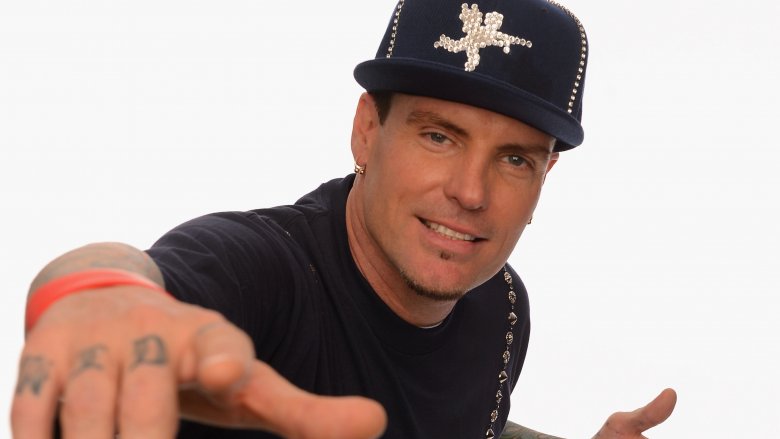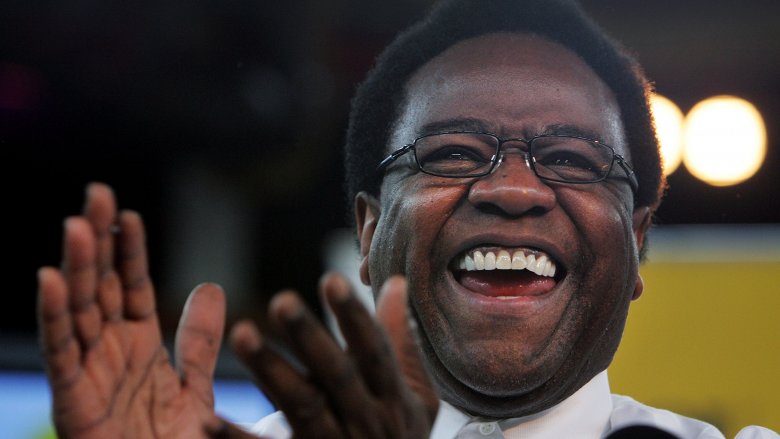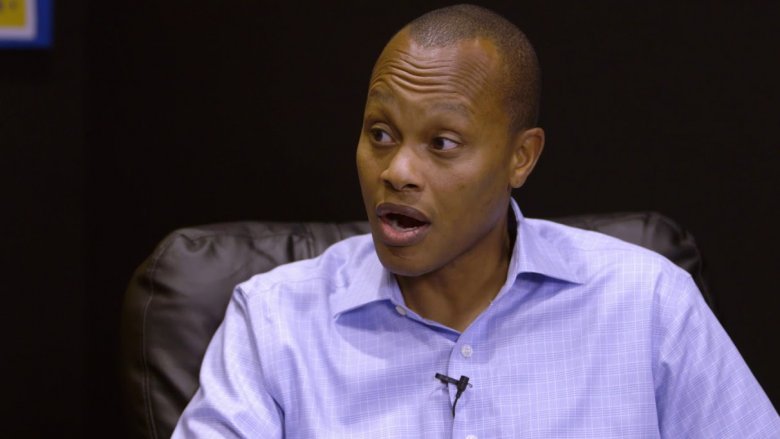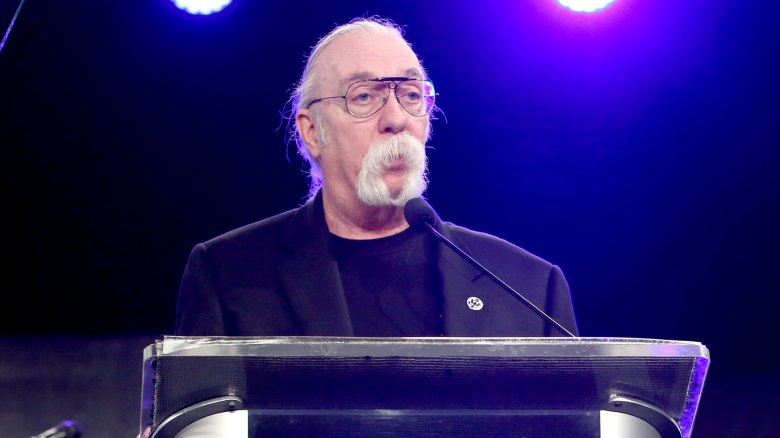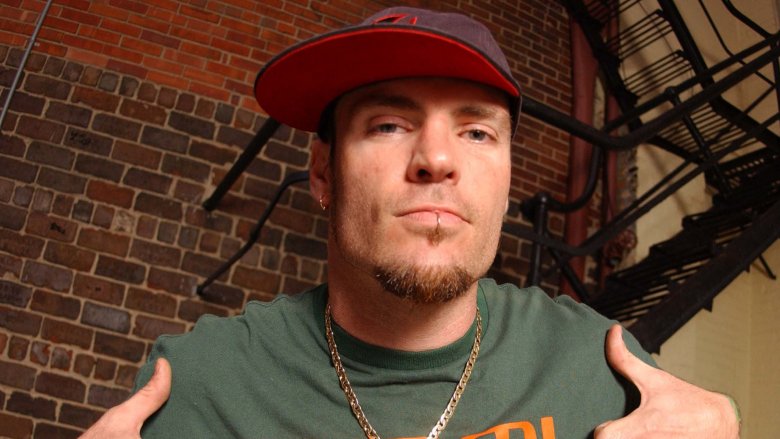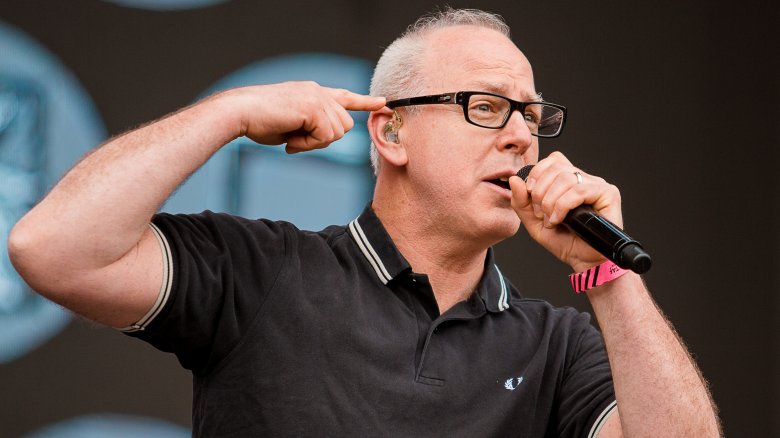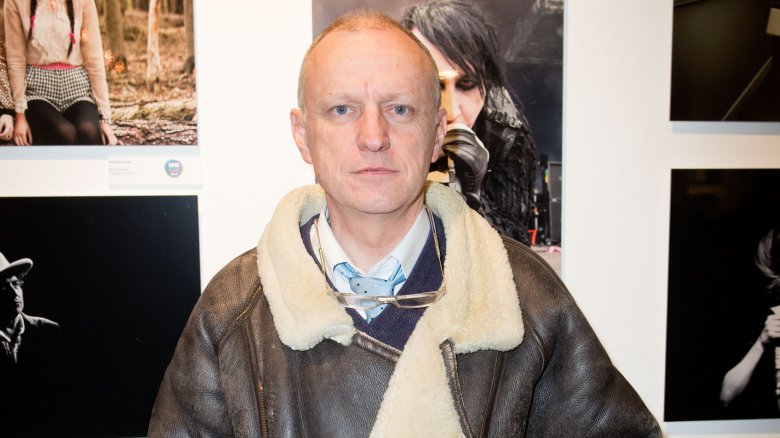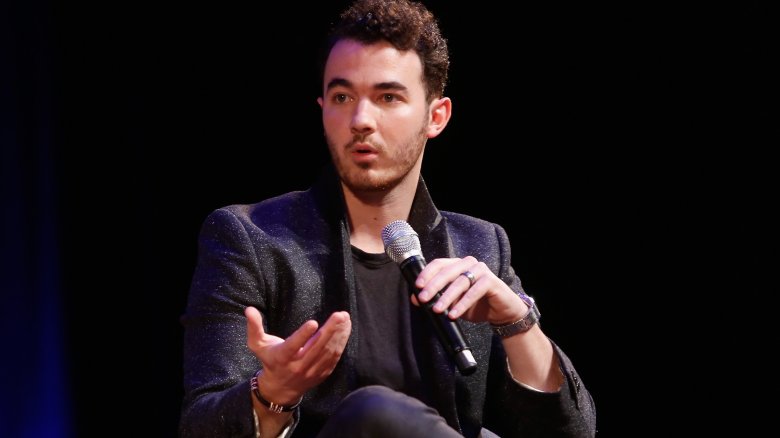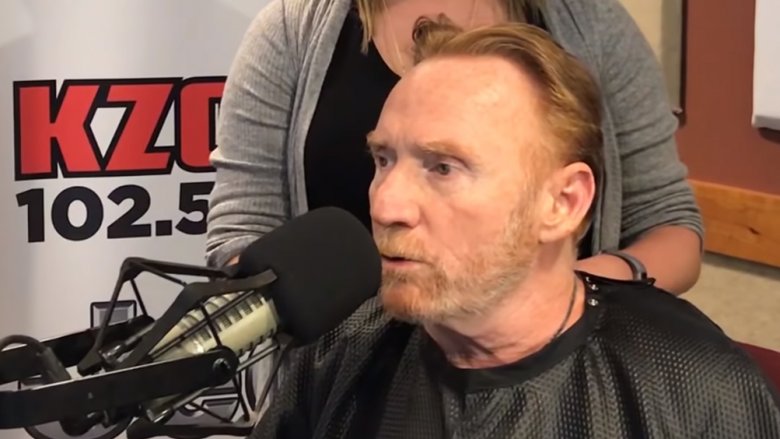Musicians Who Work Totally Normal Jobs Today
Imagine attending a life science course in college, and your professor is the same guy whose band you saw play last summer in a club. Or you're taking a tour of a stunning new home and discover it was built by a Jonas brother, or renovated by the guy who did "Ice Ice Baby" back in the early '90s. Or you turn on CNN one day and see that the guy with the handlebar mustache who is speaking quite knowledgeably about anti-terrorism policy was the same guy on the cover of that Doobie Brothers record your parents had way back when, the one with "What a Fool Believes" on it. Or you're on vacation in London and throw your back out, and the chiropractor who takes your emergency office visit used to play drums for the Clash.
All of the above things could conceivably happen because plenty of musicians or former musicians have given up the limelight for those types of day jobs, or work on their music as a side interest around their more staid new careers. Here are musicians who work totally normal jobs today.
Tragedy leads Al Green back to the Gospel
In 1974, Al Green was one of the most popular singers in the country. Hits like "Let's Stay Together," "Here I Am (Come and Take Me)," and "Love and Happiness" made him a household name, and virtually anything he wanted — women, drugs, and other indulgences — was his for the asking. But fame and fortune were not making him happy. He had already begun to revisit his Christian faith to find some meaning in it all. Then, on one tragic afternoon, Green was taking a bath when his girlfriend rushed into the bathroom and dumped scalding hot grits on him, leaving him severely burned, before she retreated to another room and committed suicide with one of Green's own guns.
He retreated partially from the limelight, becoming an ordained minister and releasing a handful of secular records before abandoning popular music for nearly a decade, in favor of gospel. While in the midst of this retreat, in December 1976, Green opened the Full Gospel Tabernacle church in Memphis, and he has preached there most Sundays ever since. Often, church members have to share pews with visitors who come in to see Green preach, because he's Al Green. "You might have come on your vacation — we get a lot of that," he told a Houston TV station. "Well, we say while you're here, why don't we do a little bit of 'Amazing Grace.' It may help you along your way."
Erykah Badu brings new souls into the world as a doula
Neo-soul songstress Erykah Badu has been a practicing doula since 2001, helping dozens of mothers deliver their babies either at home or in birthing rooms. A doula, according to National Childbirth Trust, provides physical and emotional (though non-medical) support to mothers and their families during and after childbirth, letting them know what is happening throughout and assisting them in the decisions they make. Badu refers to her role as "the welcoming committee," helping usher new life into the world and being a calming presence for mothers. "I started studying on my own, different techniques, and the variables of what being a doula is about," she told Origin Magazine (via the Huffington Post.) "I learned to originally be like water, in the place that I was, so that I could be a container for whatever they need. I love being of service in that way."
Badu estimates she has helped bring more than 40 babies into the world and she keeps up with all of them; as she told radio personality Sway, the children refer to her as their "Badoula." Badu also spends time in hospice centers, to sit at the bedsides of and provide comfort to those who are close to death, because "the main thing I want is for people's spirits to be at peace, whatever happens next."
David Kelly goes from rapper to NBA lawyer
In 1991, he opened hip-hop shows for national acts like A Tribe Called Quest and Arrested Development. Later, he joined the hip-hop group All Natural, with whom he would record five albums, and in 2010, he made a solo album, Polymath, that was named independent album of the year by the Chicago Tribune. He was rapper Capital D, also known as Cap D, also known as Chicagoan David Kelly, who is now known as general counsel for the Golden State Warriors, a legal executive for the champions of the NBA. Kelly made the change from full-time rapper to part-time rapper/full-time University of Illinois law school student after getting married in 2000, according to the San Francisco Chronicle. After graduating, he joined a prestigious Chicago law firm and, two years after that, joined the Warriors.
"I always tried to be more thoughtful than your typical [rapper]," Kelly told the legal blog Above the Law. "Political stuff, racial issues, just the image people have of the black man or black people, I wanted to attack that. The image that black people have of ourselves, I wanted to attack that." He still dabbles in rap, but these days it's more of a hobby, or a way to surprise new Warriors players who don't believe their general counsel can spit a verse, or that he once judged Eminem in a rap competition. Kelly says he has no regrets about his career — only he can probably tell you that in a rhyme.
'Skunk' Baxter goes from finger-picks to arms ... as in missiles
In the '70s and '80s, Jeff "Skunk" Baxter was one of the most sought-after guitarists around, playing on countless recording sessions and incorporating his six-string magic into two of the era's biggest bands, Steely Dan and the Doobie Brothers. In the mid-'80s, the musician became fascinated with how similar music recording technology was to the technology guiding the United States' defense systems. "Radar," he has said, "is just an electric guitar on steroids." According to the Pittsburgh Post-Gazette, Baxter's neighbor, a retired engineer, got him interested in military-related publications, which turned into Baxter writing a paper on converting an existing military ship-to-air missile system into one for military defense. He didn't know it at the time, but his second career — as a defense consultant — had just begun.
"Most people start out in the military and then have a [civilian] career," Baxter told D'Angelico Guitars. "I did it the other way around; I started out with a great music career and then started doing things for the U.S. government." Baxter has, over time, expanded his knowledge into areas of counterterrorism and is regularly called upon to play the role of an enemy force (or "red team") in defense strategy war games. In these scenarios, he is known for his creativity and tactics that very closely resemble those in which enemies would engage. "I'm told I make a very good bad guy," he says.
Word to your realtor: Vanilla Ice flips houses
Few rappers rose to fame as quickly as Vanilla Ice did back in 1990, when his hit "Ice Ice Baby" was all over the radio and his album To the Extreme was No. 1 for four months. Few famous rappers have lost standing as quickly as Vanilla Ice did, though. Between acting (poorly) in his own movie, to his cameo in (and theme song for) a Teenage Mutant Ninja Turtles movie, to his follow-up album that yielded no hits and did not even chart, Ice fell hard and fell fast. At one point in the mid-'90s, he was left just dabbling in music while building a reputation as a competitive Jet Ski racer, before returning to the studio to make a rap/metal album aimed at the Limp Bizkit crowd. (It didn't work.)
Ice then did something remarkable. He took some of those "Ice Ice Baby" residuals and invested in real estate, becoming quite adept at buying properties, fixing them up, and reselling them at a higher value — commonly known as "flipping" the properties. To the surprise of just about everyone but Ice himself, he was really good at it. He became more or less a full-time real-estate mogul and a remodeling expert, creating his own company (Vanilla Ice Real Estate) and even starring in his own reality television series, The Vanilla Ice Project, on the DIY network. He still tours occasionally, but Ice's hip-hop concerns take a back seat to his house-flipping concerns.
Bad Religion's Greg Graffin evolves into an educator
Growing up, Greg Graffin had what he once called "a congenital distaste for authority." He rebelled against almost all forms of oversight, particularly those authority figures who he felt subscribed to dogmatic attitudes, unwavering in their beliefs and insistent that others take them as their own. Graffin's most immediate, visceral response to such figures can be found in his music — the insistent wall of sound he has made with his band Bad Religion for nearly 40 years. Through his lyrics, Graffin has spoken directly to audiences, providing them with food for thought and ammunition to use in arguments against those people and institutions that would hold them down. Bad Religion's music gives listeners an outlet for their frustration, an abstract object they can punch without fear of hurting themselves or others. All they have to do is plug into it.
Graffin is also a son of academics and an academic himself, holding a PhD in zoology from Cornell and acting as a lecturer in life sciences, paleontology, and evolution. He does not subscribe to any religion, nor does he consider himself an atheist. He instead argues that he is a naturalist. "Things we consider mysterious need not be attributed to a deity," he told the Denver Post. In a way, such beliefs are a continuation of a lifelong rebellion against authority, a questioning of what many consider settled matters.
Terry Chimes switches from punk rock to alternative medicine
Terry Chimes was a founding member of the great British punk band The Clash. He drummed on the band's universally acclaimed 1977 debut album, providing the rhythm and the propulsion for songs like "White Riot," "Career Opportunities," and "I'm So Bored with the U.S.A." He left after that record, but returned in 1982 to replace his replacement, Topper Headon (who was kicked out of the band because of a drug problem) and see the band through its greatest commercial moments — a Top 10 album (Combat Rock) and single ("Rock the Casbah") and a stadium tour, opening for The Who during their first farewell. After leaving The Clash yet again, he drummed for bands as diverse as glam rockers Hanoi Rocks and metal icons Black Sabbath before giving up music as a full-time occupation.
Instead, Chimes turned to health care, becoming a chiropractor in 1993 and, over time, opening five clinics in London. He estimates he has provided patients with over 250,000 treatments and has also established a chiropractic consultancy. Chimes is an outspoken advocate for overall health and wellness, giving lectures and supporting charities that are likewise inclined. (He was also chairman of the board for the YMCA of East London for many years.) "People say how can you prefer treating patients to being on stage in front of 100,000 people?" Chimes told the BBC. "But if you can get someone healthy, there's a satisfaction in that which is much more profound."
Dave Rowntree of Blur practices law and influences it
In the mid-'90s, if you were a fan of British rock, you had to make a choice — Oasis or Blur? The two bands seemed to vie for the top of the charts more or less constantly. Every time you turned around, one was replacing the other with their latest single. There was some great music being made between them, too, until Oasis broke up and the members of Blur spun off to do side projects, reuniting every few years to release new music. (Their last album dropped in 2015.) Members' side projects were varied. Singer Damon Albarn, for example, formed the band Gorillaz and had more hits. Drummer Dave Rowntree went a different route. According to the Independent, he became a computer animator and owner of his own animation company, flew planes, and went to law school and became a criminal lawyer.
That last occupational shift was particularly telling of his interests. While at one point serving as a temporary paralegal, he told the legal blog Above the Law he was fascinated by the trials he covered. "I've done some amazing things with Blur," he said, "but that, for me, was more interesting." He has served as a solicitor — one who, under British law, provides advice to clients, drafts documents, negotiates, and prepares cases for trial. In 2017, he was also elected to the county council in Norfolk, U.K., taking 59 percent of the vote.
Kevin Jonas goes from making hits to building houses
At the peak of their fame, the Jonas Brothers made platinum albums, packed arenas, and even had their own television show. Even their side projects were hits, like brother Nick's Nick Jonas & the Administration. When the band split up in 2012, Kevin Jonas stayed busy as the star, along with wife Danielle, of the reality series Married to Jonas, which documented the couple's domestic life, much in the same vein of Jessica Simpson and Nick Lachey's hit series Newlyweds: Nick and Jessica from the previous decade. When efforts to reunite the Jonas Brothers failed, Kevin Jonas embraced another passion, far removed from the lights and glitz of the pop star life.
He became a contractor, forming Jonas Werner Fine Custom Homes and embarking on a completely different professional path from his musician brothers. One look at the photos of their high-end designs tells you that Jonas means business — this isn't simply a hobby, or a passing fancy for someone with too much time, who would rather be doing something else. "I've always looked at everything I do as a business, including the Jonas Brothers," he told the New York Daily News. "I like to get my hands dirty. I've been blessed in my life where I get to say 'You know what? I want to do this.'" He's even hands-on, building a home on Real Housewives of New Jersey.
Danny Bonaduce stays on the airwaves as a DJ
The '70s sitcom The Partridge Family was broadcast for four seasons in its initial run and has enjoyed a much longer life in syndication. In those shows, Danny Partridge is the perpetual redhead preteen bass player, always ready with a sardonic comment. For Danny Bonaduce, who played that role, life was never the same after the show went off the air. He worked infrequently at acting jobs, got into trouble on occasion, and slowly adjusted to life as a former child actor.
In the late '80s, Bonaduce began a career in radio, signing on at WEGX in Philadelphia. In subsequent years, he moved around the United States, taking on work at various stations while still maintaining his status as a celebrity — he even had his own reality show, Breaking Bonaduce, as well as appearances on other television programs and the occasional hosting gig. Today, he broadcasts in Seattle, doing a morning drive-time show on a classic rock station. He's been a staple on the station since 2011, and says its right where he wants to be. "Seattle is the most beautiful city I have ever seen," Bonaduce told the Seattle Post-Intelligencer. "The first time I visited, I thought someone put a major metropolitan city in the middle of Yosemite National Park. I can't believe I get to live and work here."
